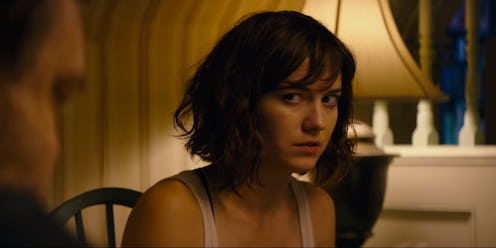
In the Oscar-winning drama Room, Brie Larson's character, after being trapped for years in a locked room with her young son, fights for her freedom and makes a daring escape. In the sci-fi drama Ex Machina, Ava, a brilliant android, plans a breakout from her captors, much to their surprise; in the apocalyptic thriller Mad Max: Fury road , Imperator Furiosa and her gang of women flee from Immortan Joe, the leader who wants to keep them hostage. As the A.V. Club writes, 2015 was the year cinematic women broke out of prison — and several upcoming films, including 10 Cloverfield Lane , seem insistent on continuing that trend. Yet while this theme of women breaking free is certainly exciting, the fact that audiences are so intent on watching it happen feels, to me, a little less about the greatness of female characters finding empowerment and more about the unsettling thrill of seeing them trapped in the first place.
Just look at how many movies are out, or coming out, about this very specific theme. Other than Room, Mad Max, and Ex Machina, the upcoming sequel 10 Cloverfield Lane finds Mary Elizabeth Winstead’s character Michelle a prisoner in John Goodman’s survival bunker, intent on escaping. Then there's this summer's Suicide Squad, which centers around a crew of criminal supervillains who are let loose, including Harley Quinn, a brilliant psychiatrist who's locked away in Arkham Asylum until she and the rest escape. And there's even Star Trek Beyond , which, in its trailer, hints at an imprisoned female alien who joins the Enterprise team to break out of some unknown intergalactic prison.
While there's no denying that seeing women escape their torturous surroundings can be empowering, it worries me that the existence of so many movies about just that is fetishizing female prisoners, rather than celebrating female strength. It's not that there's nothing feminist about these movies — Furiosa’s freeing of Immortan Joe’s sex slaves, Ava’s revolt against Caleb and Nathan, and Ma’s breakout of Room represent not only actual freedom, but rejection of oppressive patriarchal restriction — but the ubiquity of the theme points to a possible ulterior motive. Audience members might enjoy watching powerful women fight their way out of oppressive situations, but are there some people who enjoy watching only the imprisoned part, especially when the female characters at the center are considered sexy, or attractive?
The strong, mostly male reactions to Harley Quinn and the Star Trek character, for instance, maintain the idea that imprisoned women are sexy as hell. Capturing women for their safety (as Goodman's character in Cloverfield, say, appears to be doing) or freeing them from imprisonment both imply the concept of reward, oftentimes sexually; many of the female stars of the movies named above are sexual slaves during their captivity, and the films don't shy away from making that known. And even when the intentions are good, it still comes off as a bit creepy — viewers are watching these women suffer at the hands of men, yet in some of these cases, the characters are still viewed as "sexy" or "hot."
Women in prison have always been tantalizing subject matter. Much of the success of Orange is the New Black is the result of having lured audiences in with a supposedly scandalous premise — an attractive, bisexual woman, Piper, finding herself in a female-only prison — only to flip the switch and keep eyes on the screen through interesting character development. Over the course of the series, the fetishisms of women in jail have become the least interesting aspect of the show. And despite my hesitance over their plot points, some of the movies above flipped the switch, as well; through physical strength and intelligent manipulation, Ava, Furiosa, and Ma all became the heroes of their stories. I can only hope that the films of 2016 achieve the same goal, and don't make their female imprisonment premises miss the point.
Images: Paramount, Warner Bros.